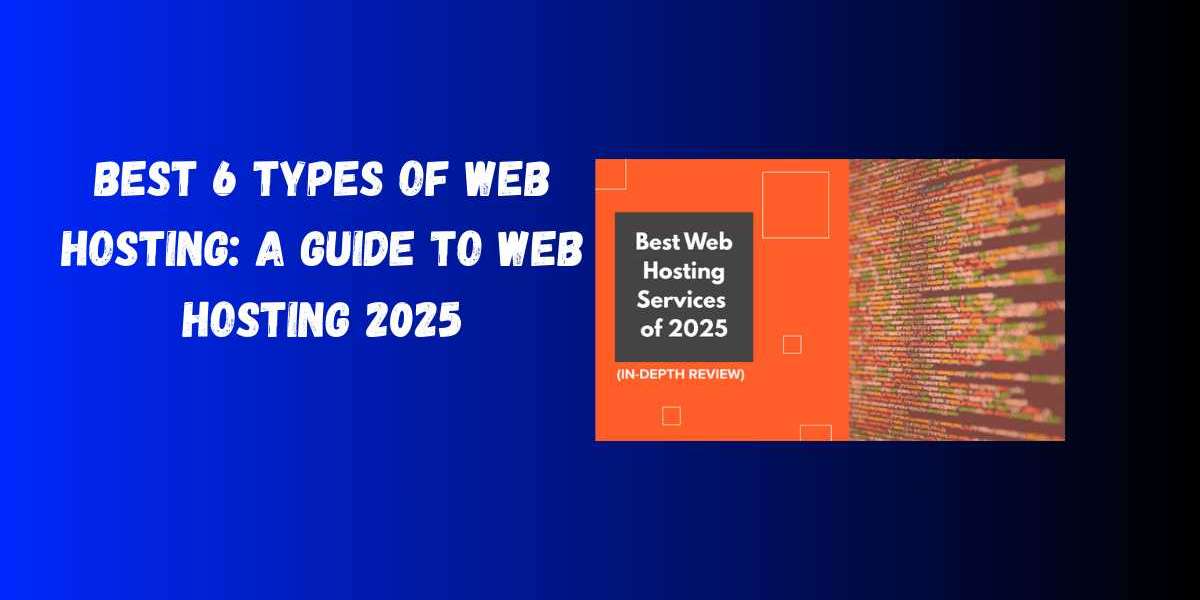Introduction
Web hosting is the foundation of every website. Whether you’re launching a personal blog, building an online store, or running an enterprise platform, choosing the right hosting type can make or break your site’s success. In this article, we’ll explore the Best 6 Types of Web Hosting: A Guide to Web Hosting 2025 breaking down their features, benefits, and best use cases so you can make the right choice.
- Shared Hosting
What it is: Multiple websites share the same server resources.
Best for: Beginners and small websites with low traffic.
Pros:
- Affordable and easy to set up.
- No technical skills required.
Cons:
- Limited resources.
- Performance may suffer during traffic spikes.
- Virtual Private Server (VPS) Hosting
What it is: A physical server is divided into virtual partitions, giving each user dedicated resources.
Best for: Medium sized businesses and growing websites.
Pros:
- More control than shared hosting.
- Scalable as your site grows.
Cons:
- Costs more than shared hosting.
- Requires some technical knowledge.
3. Dedicated Hosting
What it is: Your website gets an entire server to itself.
Best for: Large businesses, enterprises, and high traffic websites.
Pros:
- Maximum control and customization.
- High security and performance.
Cons:
- Expensive.
- Often requires IT expertise.
- Cloud Hosting
What it is: Your site runs on multiple connected servers instead of a single physical one.
Best for: Startups, SaaS apps, and websites that need scalability.
Pros:
- Flexible and scalable.
- High uptime and redundancy.
Cons:
- Pricing can be unpredictable.
- May require advanced setup.
- Managed Hosting
What it is: A hosting service where the provider handles server management, updates, and security.
Best for: Businesses that want hosting without the technical hassle.
Pros:
- Stress-free maintenance.
- Optimized for performance and security.
Cons:
- More expensive than unmanaged hosting.
- Limited customization options.
- WordPress Hosting
What it is: Hosting designed and optimized specifically for WordPress websites.
Best for: Bloggers, small businesses, and WordPress users.
Pros:
- Pre-installed WordPress and updates.
- Enhanced security for WordPress.
Cons:
- Limited to WordPress sites only.
- Fewer customization options.
Choosing the Right Hosting for Your Needs
Hosting Type | Best For | Cost Level | Technical Skill Needed |
Shared Hosting | Beginners hobby sites | Low | None |
VPS Hosting | Growing websites SMBs | Medium | Moderate |
Dedicated Hosting | Enterprises high traffic sites | High | Advanced |
Cloud Hosting | Startups scalable apps | Medium High | Moderate |
Managed Hosting | Businesses seeking simplicity | Medium High | Low |
WordPress Hosting | WordPress users bloggers | Low Medium | Low |
Real-World Example
A small blog may start with shared hosting but quickly outgrow it as traffic increases. Moving to VPS or cloud hosting ensures scalability without major downtime. Meanwhile, enterprises with sensitive data often rely on dedicated hosting for maximum control and compliance.
Conclusion
In 2025, web hosting is more advanced, flexible, and customizable than ever. From affordable shared hosting to enterprise-level dedicated servers, the Best 6 Types of Web Hosting: A Guide to Web Hosting 2025 helps you understand your options and choose the right solution for your goals.
For expert hosting comparisons and step-by-step guides, visit Hosting Mastery Hub, your trusted partner in web hosting knowledge.







